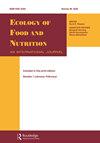The Correlation between Social Media Addiction and Emotional Eating during the COVID-19 Quarantine Period.
IF 1.3
4区 医学
Q4 NUTRITION & DIETETICS
引用次数: 1
Abstract
This study was conducted with 458 participants. The demographic and health information of the participants along with the Social Media Addiction, Emotional Eating Scale were obtained. The level of social media addiction in adults was moderate, and women were more interested in social media than men. As the average age of participants increased, the virtual tolerance, virtual communication, social media scores decreased (p < .05). The study found that 51.6% of individuals with emotional eating tendencies happened to be obese. The social media addiction scale scores of those with emotional eating tendencies were higher than those without emotional eating tendencies (p < .05).
COVID-19隔离期间社交媒体成瘾与情绪性饮食之间的相关性
这项研究有458名参与者。获取参与者的人口统计和健康信息以及社交媒体成瘾、情绪饮食量表。成年人的社交媒体成瘾程度适中,女性比男性对社交媒体更感兴趣。随着参与者平均年龄的增加,虚拟容忍度、虚拟沟通、社交媒体得分下降(p . 539)
本文章由计算机程序翻译,如有差异,请以英文原文为准。
求助全文
约1分钟内获得全文
求助全文
来源期刊
CiteScore
3.50
自引率
0.00%
发文量
23
审稿时长
>12 weeks
期刊介绍:
Ecology of Food and Nutrition is an international journal of food and nutrition in the broadest sense. The journal publishes peer-reviewed articles on all aspects of food and nutrition -- ecological, biological, and cultural. Ecology of Food and Nutrition strives to become a forum for disseminating scholarly information on the holistic and cross-cultural dimensions of the study of food and nutrition. It emphasizes foods and food systems not only in terms of their utilization to satisfy human nutritional needs and health, but also to promote and contest social and cultural identity. The content scope is thus wide -- articles may focus on the relationship between food and nutrition, food taboos and preferences, ecology and political economy of food, the evolution of human nutrition, changes in food habits, food technology and marketing, food and identity, and food sustainability. Additionally, articles focusing on the application of theories and methods to address contemporary food and nutrition problems are encouraged. Questions of the relationship between food/nutrition and culture are as germane to the journal as analyses of the interactions among nutrition and environment, infection and human health.

 求助内容:
求助内容: 应助结果提醒方式:
应助结果提醒方式:


